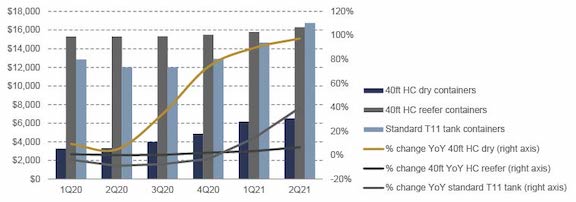Prices of dry freight shipping containers have doubled over the past year to reach historic highs but will moderate over the next few years, according Drewry’s recently published Container Census & Leasing Annual Review and Forecast 2021/22 report.
Dry box newbuild prices rallied strongly in 2020 from the lows of the prior year to reach their highest level since 2011 by the fourth quarter, with a YoY gain of 75%. Then by 2Q21 40ft high cube containers breached the $6,500 threshold, more than doubling over the year, to reach their highest value since Drewry started monitoring container equipment prices back as far as 1998.
In sharp contrast, reefer and tank container prices changed little over 2020, but rallied in the first six months of 2021, up 6.5% and 40% YoY, respectively, in 2Q21. Prices of these specialist container types have different cost drivers to dry containers and are expected to continue rising although at a moderate pace over the next few years.

Newbuild container output has soared through the first six months of 2021, with China dry box output climbing 235% YoY to 3 million teu and reefer production more than doubling to 260,000. Drewry expects full-year production to reach 5.2 million teu, representing a 67% YoY rise. The main buyers of this equipment have been lessors, accounting for 68% of newbuild purchases. But Drewry expects carriers to invest more in their own container pools over the near term given their much improved levels of profitability.
Despite record newbuild output, insatiable demand for equipment raised utilisation of the leased fleet across all equipment types to over 99% by the second quarter of 2021, its highest level on record. This drove dry box LTL per diem rates to their highest level in 10 years, doubling over the year, bringing investment cash returns (ICRs) back to pre-pandemic levels.
“Looking ahead, dry box per diems are forecast to rally 65% in 2021, the steepest rise since Drewry started recording lease rates in 1990,” added Fossey. “This acceleration will outpace that of newbuild prices as the lagging effect means that lease rates will stay higher for longer, lifting ICRs further. But thereafter we expect some softening of returns.”







